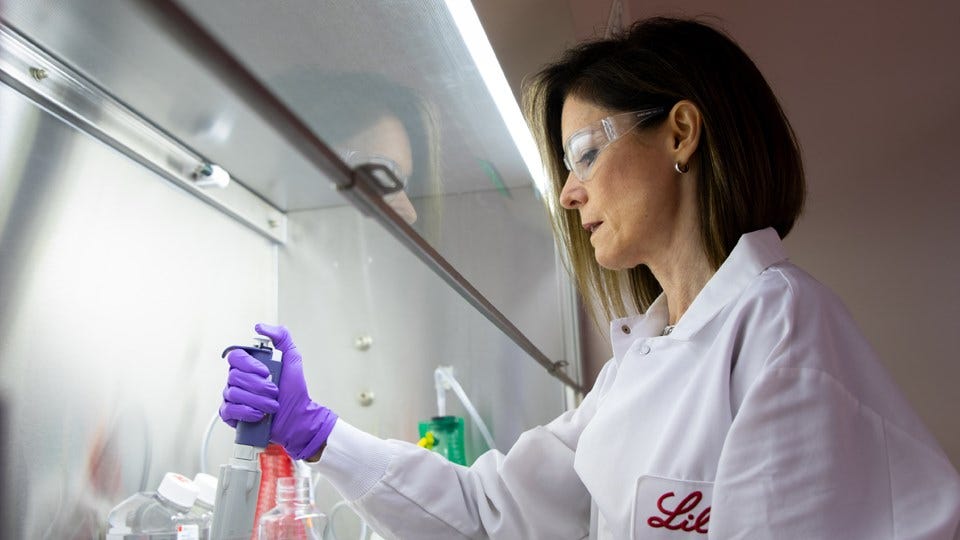Indiana sizing up possible bid for new federal life sciences hub
Subscriber Benefit
As a subscriber you can listen to articles at work, in the car, or while you work out. Subscribe Now
It could be one of the most competitive site selections since the stampede for Amazon’s HQ2, but Indiana officials are keeping their cards close to their vest on whether they plan to submit a bid.
The federal government’s new health research agency, formed last year, announced a competition March 15 for two locations that could bring hundreds of jobs to the winning bidders.
The Advanced Research Projects Agency for Health, or ARPA-H, is looking for cities that can help design biomedical products, enhance clinical trials and bring new health products to market.
The agency has a $2.5 billion budget and says it wants to shake up the conventional model of funding biomedical research, which some say is too slow, by funding higher-profile projects.
It might seem like a natural fit for Indiana, home to nearly 2,500 life-science companies, 63,000 employees and more than $12 billion in exported products, from pharmaceutical drugs to surgical stents.
But even as some neighboring states, including Illinois, are talking up their plans to submit a bid, Indiana officials are keeping a more cautious stance.
BioCrossroads, a not-for-profit that acts as a champion for the Indiana life sciences sector, declined to comment and referred questions to David Roberts, CEO of the Applied Research Institute, a not-for-profit that works with universities, industry and the government on innovation issues.
In an interview with IBJ, Roberts hedged several times when asked directly if Indiana plans to submit a bid.
“We’re interested in exploring whether or not we can put forward a competitive offering and compete for that opportunity,” said David Roberts, former chief innovation officer of the Indiana Economic Development Corp. “…It’s going to be a highly competitive environment.”
In a follow-up email, he wrote: “There are multiple avenues for Indiana to play a key role in ARPA-H, and we are actively exploring all of those options.”
The IEDC, the state agency charged with driving economic development and growing Indiana’s economy, didn’t have an immediate comment on the issue.
But already, some other states, including Massachusetts, Texas and Georgia, are lining up support to try to win the competition. Illinois officials are also angling for a piece of the action.
U.S. Sen. Tammy Duckworth, a Democrat from Illinois, told Crain’s Chicago Business she has already been in touch with ARPA-H Director Renee Wegrzyn, who was appointed in October, and plans to show her what Chicago can offer.
“I’m proud to help lead Illinois lawmakers in this effort because the new Advanced Research Project Agency for Health having a hub in Chicagoland would mean more jobs, a focus on health equity that could address the disparities that disproportionately impact working Illinoisians of color, and some of our state’s brightest minds would be collaborating on cures for cancer, ALS and more,” Duckworth said in a statement to Crain’s.
The agency, set up last year, was modeled on the Department of Defense’s research arm, the Defense Advanced Research Projects Agency, or DARPA, which is responsible for the speedy development of emerging technologies for use by the military.
It’s unclear how many jobs are at stake, and how much they would pay.
ARPA-H’s announcement outlining its strategy for site selection said it will locate its main office somewhere in the Washington D.C. area—or as it called it, the “national capital region.”
The two hub offices will be located in other cities across the U.S., “forming the foundation of a nationwide health network” that advances the agency’s mission to accelerate better health outcomes for everyone.
One hub, called a “customer experience hub” will design health products and services, help enhance clinical trials, reach “representative patient populations” and capture data for future use.
The other hub, called an “investor catalyst” will provide resources to help medical innovators bring their ideas to market.
Roberts at ARI said in an interview last week he started “hearing rumblings” a few weeks ago. “So we were certainly aware of it tracking it. And now we’re just kind of finalizing the strategy that we would employ.”
ARPA-H said it expects to announce the winning locations by early fall, and “the period of performance of each hub will be five years.”
